The “No Gaps” Approach to Reading and Spelling
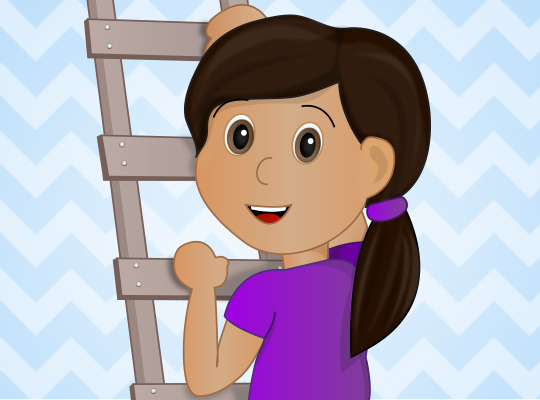
Does your child have gaps in reading and spelling?
Hundreds of thousands of children struggle to learn to read and spell. They spend hour after tiring hour being fed information, only to eventually be tagged as “unable to read” or labeled with a learning disability that keeps them from being able to spell.
It’s hard to believe, but according to statistics reported in 2019, more than 60% of fourth graders in the United States were reading below proficient levels.1 2
That’s a staggering number.
Let’s think about that for just a moment.
If you lined up ten random fourth-grade kids from across the United States…
… only four of them would be able to read at a proficient level. Just four. Six of the children would only be able to read at a basic level or below.
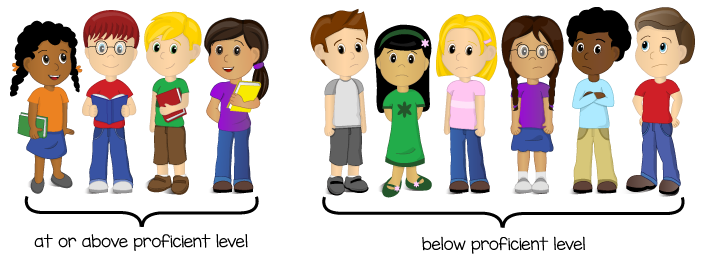
But if you live in certain states, it’s even worse: 72% of fourth graders in Michigan read below proficient levels. In New Mexico, it’s 77% of fourth graders. Among black students, it’s 81% of fourth graders. (Check out the reading stats for your state as reported by the U.S. Department of Education.)
However, these grim statistics don’t tell the whole story.
The Problem: Gaps
More often than not, the problem doesn’t actually lie with the child. Most reading and spelling problems are caused by gaps in the reading or spelling curriculum. Gaps are created when programs don’t follow incremental steps, or when information is taught in an illogical sequence. Such programs don’t build sequentially upon the information the child has already mastered. These gaps can cause lots of problems for kids. Here’s why…
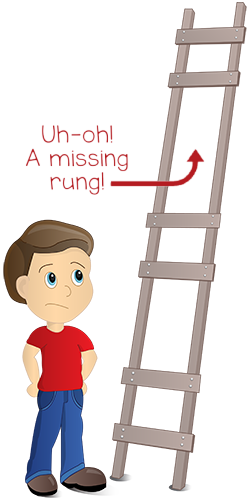
Imagine Climbing a Ladder with Missing Rungs
You’re in front of a tall ladder, and you’re expected to climb to the top. There’s a reward up there, and you’re excited to grab it. You don’t know it yet, but this particular ladder has a few problems. In fact, the ladder has some missing rungs. But it’s your job to climb it, so you begin.
Climbing the first and second rungs of the ladder doesn’t present a problem—the rungs are adequately placed, and you can put one foot ahead of the other. But when you lift your foot for the next step, you hesitate…because there is a gaping hole where the third rung should be. In order to take the next step, you have to really stretch. You have long legs and a strong upper body, so you can do it—but it isn’t easy. You make that big step and pull yourself up the ladder.
But wait! When you take the next step, you realize that there is another missing rung in the ladder. Good thing you are up to a physical challenge! Reaching and stretching, you eventually climb to the top of the ladder and claim your reward.
But What If You Can’t Overcome the Missing Rungs?
What if your legs aren’t long enough to stretch over the gaping holes? What if you don’t have the upper body strength to pull yourself up to the next rung? You will likely become discouraged and defeated, and may eventually give up. Should you be labeled as having a ladder-climbing disability for not being able to climb the ladder?
You may think it’s your fault that you can’t climb the ladder, but it’s not. The cards were stacked against you from the very beginning. The ladder wasn’t well constructed, so the designers of the ladder are to blame for the failure. The problem isn’t with you; the problem is with the ladder and its missing rungs.
A properly designed ladder makes climbing to the top possible—even for a person with challenges that would make climbing a faulty ladder impossible.
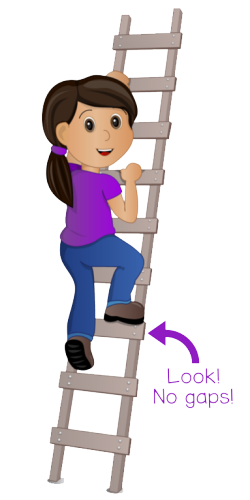
Learning to Read and Spell Is a Lot Like Climbing a Ladder
Each rung on the ladder represents an important concept that helps students get closer to the goal of fluent reading and spelling. If a rung (or concept) is missing, climbing (or learning) is harder than it needs to be. And as you can imagine…
…it’s much easier to climb a ladder that has all of its rungs.
For some children, a reading or spelling curriculum with missing steps is not a problem. Just as your long legs would help you climb a ladder with missing rungs, some children are able to intuitively fill in the gaps in a reading or spelling program.
But for many children, those missing steps present an insurmountable obstacle. Just like some people don’t have the physical makeup to climb a faulty ladder, some children aren’t wired to make the big jumps that many reading and spelling programs require.
Your Curriculum Choice Can Make the Difference Between Success and Failure
When I developed All About Reading and All About Spelling, I had a clear image of a ladder in my mind. I spent thousands of hours analyzing each and every step, making sure there were no gaps. I wanted every child to have the benefit of clear, concise, well structured, and fail-proof teaching.
(Click here if you’d like to view samples of my “no gaps” approach.)
All About Reading and All About Spelling teach through a research-based, logical sequence with NO GAPS. Both programs are “ladders” with precisely placed rungs that make it easy for your student to climb to the top, regardless of his age or ability. With this approach, kids can successfully climb to the top of the ladder—step by step by step—and reap the rewards of mastery in reading and spelling without all the struggles along the way.
Download my free e-book to discover twenty more tips for teaching reading and spelling!
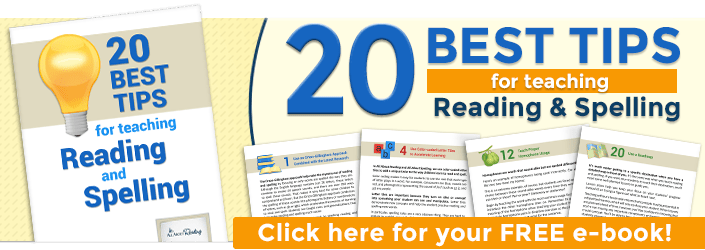
___________________________________
1. nationsreportcard.gov. Accessed 12/4/2019
2. McFarland J., et al (2019). The Condition of Education 2019 (NCES 2019-144). Washington, DC: U.S. Department of Education, National Center for Education Statistics, page 91. Available: nces.ed.gov.




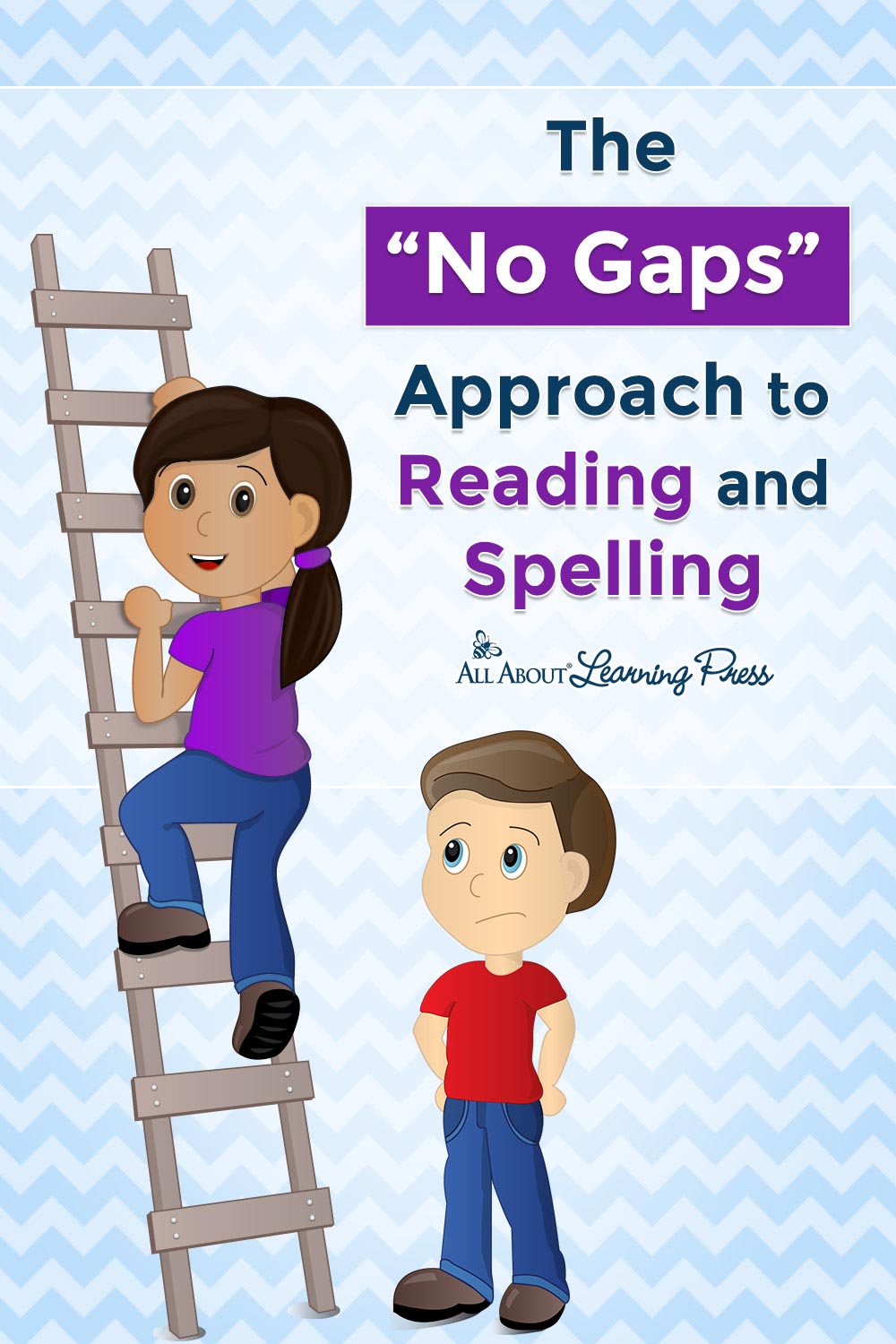





Jenny S
says:When is it suggested to start the All About spelling program, if doing the All About Reading also??
Robin
says: Customer ServiceGreat question, Jenny!
We generally recommend starting All About Spelling after a child has completed All About Reading Level 1. We discuss this in our The Right Time to Start Spelling article.
Let me know if you have additional questions or concerns.
Rhonda Cunningham
says:This is the exact reason we chose AAR and AAS! We couldn’t be happier with that decision!
Robin
says: Customer ServiceThank you, Rhonda! Great to hear it was a good decision for you!
Sarah
says:We’re so grateful we discovered AAR/AAS for homeschooling out children. Thank you for all you do!!
Robin
says: Customer ServiceYou are so welcome, Sarah!
Jardel
says:Thank you for sharing these insights and for developing 2 thorough curriculums/programs to help avoid these gaps! A couple of my kids have both reading and spelling gaps that have become more apparent in their middle school years. As we work on addressing these, I’m hopeful that your spelling and reading programs will help.
Robin
says: Customer ServiceJardel,
I’m sorry to hear that your kids have gaps, but All About Reading and All About Spelling both have excellent track records for filling those gaps and helping students succeed!
Let me know if you have questions about placement or anything else. I’m happy to help!
Mary
says:I think this is a unique and thought-provoking method to teach children to read. Do you also have a method to teach mathematics?
Robin
says: Customer ServiceThank you, Mary.
I’m sorry, no. We do not produce any mathematics materials. However, here are a few programs for you to consider that use explicit, incremental, and/or multisensory teaching:
– Math-U-See
– Teaching Textbooks
– Right Start Math
– Shiller Math
– Singapore Math
– Math Mammoth
– Elementary Arithmetic from Simply Charlotte Mason
Rose
says:I really love the analogy of learning to read and spell as a ladder with no gaps. I am looking for ways to help my students become better spellers. I am looking for different activities that they can use to help them be successful.
Robin
says: Customer ServiceRose,
Thank you! I’m glad the analogy was helpful. Let me know if you have questions about All About Spelling, or anything else. I’m happy to help!
Wanda Clark
says:I trying to figure out to help my students bridge the gap. I have self-contained classroom grade 6th grade, 7th grade, 8th grade. Could you send me some information?
Robin
says: Customer ServiceWanda,
Thanks for your question! I’ll have our school coordinator get in touch with you by email.
Pamela Parker
says:I love your analogy! You are so right about the “gaps”! What I find frustrating is that students are not given enough time/practice to master each rung… The fast pace in which a curriculum is taught can have detrimental effects on many kiddos… Thanks for sharing your wisdom! I am so excited to try All About Spelling! I have a feeling that it is just what I need!
Pam :)
Robin
says: Customer ServiceThank you, Pam! Yes, moving through material at the right pace is crucial for learning success. Too slowly, and students are bored and don’t make their best progress. Too quickly, and the material isn’t mastered and there are holes in learning. All About Spelling is designed so that you can move through the material as quickly or as slowly as your child needs to allow for the best success for each learner!
Veronica Robbins
says:Yes please
Katelyn Evans
says:There was definitely a lot of gaps in my boys reading skills. So happy that I switched to AAR! It has been so thorough!
Robin
says: Customer ServiceGreat to hear that All About Reading has been thorough for your boys, Katelyn! Thank you.
Justina
says:This article is very helpful!! I love using All About Spelling and All About Reading with my kids!
BK
says:Enjoying AAS. My 1st grader just finished Level 1! The rules are complimenting the Language Arts curriculum we are using and she is flying through!
Robin
says: Customer ServiceIt sounds like your 1st grader is doing so well, BK!
Julie
says:My son is excelling in reading and spelling thanks to this phenomenal program!
Robin
says: Customer ServiceSo great to hear, Julie!
Tracy Lynn
says:This is why we’re switching to AAR after using another curriculum.
Christine
says:We are so looking forward to using AAR again and starting AAS. Both my kids currently attend public school but we will homeschool them the last half of the year. I definitely feel as though my son has gaps in his learning. He is only six and gets frustrated with the idea of doing more “school” after a full day of being at school so I haven’t fully introduced the AAR program to him yet aside from having him read the level 1 stories after school. He reads them willingly and independently which I know is a huge confidence builder for him. Unfortunately, he is sent home with leveled readers for the AR program at school and he was using all the tricks to “read” like guessing and memorizing because there were just too many words that he did not know the rules for yet not to mention the length of some of the texts were far too long. It became very frustrating for him. I am looking forward to helping him grow in his love for reading and learning through AAR and AAS.
Robin
says: Customer ServiceChristine,
I am so sorry your son is having to experience the frustration of being asked to guess and memorize to be able to read. I am glad to hear that he is doing well with the All About Reading Level 1 stories though.
Cherry Thorpe
says:This article is very relevant. Many children do have these missing gaps. I am experiencing this with some of my students. I am doing my best to help fill this gap. Thanks for highlighting this problem.
Robin
says: Customer ServiceI’m glad this article is relevant for you, Cherry. It is sad but true that many children do have such gaps in their learning, but wonderful to hear that you are helping them fill the gaps!
Misty
says:This is a great article. My daughter is behind in all subjects since the pandemic.
Robin
says: Customer ServiceI’m sorry to hear about your daughter’s gaps, Misty. Please let me know if I can help in any way.
MS
says:We’ve started using this program and love it!! It’s making all the difference in my home!
Robin
says: Customer ServiceI’m so pleased to hear that our program is making a difference! Thank you!
Jo
says:Yes no gaps! My 1 & 3 grader had gaps in school, so now homeschooling them in grades 2 & 4. We’ve started on level one for reading and spelling and each are going through at different speeds. They can sense the momentum they are gaining with the mastery approach, and as they reach gaps they currently had they gain excitement & confidence over mastering them! They are excited to continue progressing in their skills! It’s exciting as a parent to see them get excited for reading and spelling!
Robin
says: Customer ServiceThis is so exciting and wonderful to hear, Jo! I love that your children can sense their own momentum and how excited they are and gaining in confidence! Great work!
Cindy Hardy
says:As a parent of 3rd, 5th & 7th graders, I see gaps in their reading & spelling education. These were more obvious after the Covid lockdowns. I enjoy knowing that we can use these programs to better assist them now that we homeschool.
Teresa
says:This program has really helped my son catch up on his reading.
Kim
says:Program makes my teaching job so much easier
Kim
says:Love the sequential spelling program!
Sarah
says:So thankful for the products you offer. My daughter and son are benefiting greatly!
Lynda
says:What a great analogy. It’s easy to understand and picture.
Jen Fischer
says:Just discovered this program and it is high on my list for a spelling curriculum next year!
Robin
says: Customer ServiceWonderful, Jen! Let me know if you have questions, need help with placement, or anything else.
Martha
says:Spelling is very difficult for a child with speech development problems. We are hoping this program will be beneficial to some degree for our child.
Robin
says: Customer ServiceMartha,
We have had great reports from parents that All About Spelling being very helpful for their children with speech difficulties.
jess
says:good article.
Robin
says: Customer ServiceThank you, Jess!
Cindy
says:I’m making sure that my child doesn’t have these gaps. Thank you for this article!
Robin
says: Customer ServiceYou’re welcome, Cindy!
KaraLynn
says:I’m currently researching a spelling curriculum for my 4 kids, and this one has really been intriguing lately! I just started my 4 yr old boy on the All About Reading Pre-Reading level, and the spelling is next on my list to look at.
Robin
says: Customer ServiceLet me know if you have questions, KaraLynn, or need help with placement or anything else. I’m happy to help!